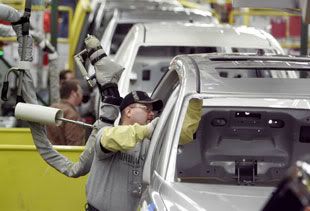The writer understands the real issue: Some people feel they have been enobled to lord it over the rest of us.
Isn't that un-American?

An honest wage for an honest day's work is what modern manufacturing
is was all about.
Reluctance to Help Detroit Reeks of Class BiasBy Warren Brown
Sunday, December 7, 2008; G02
It has happened repeatedly in the last several weeks -- well-paid, well-known journalists questioning the wisdom of "bailing out Detroit," of helping an industry whose union-represented workers have substantially better wages and benefits than other manual or skilled laborers, or, more precisely, who are better compensated than their nonunion counterparts working at foreign-owned rival companies building cars and trucks in the United States.
The questions are tinged with outrage and ridicule: Why should Americans who earn less, have inferior pension and health-care plans, help the United Auto Workers union? Why can't the UAW be satisfied with the same pay packages given at Honda, or with an even less-expensive compensation agreement for workers at the Hyundai assembly plant in Montgomery, Ala.?
The queries often come from people who earn substantially more than the estimated $71,000 annually in wages and benefits paid to UAW members. They come from people who, having reached upper-middle-class status by virtue of their college educations and communication skills, certainly wouldn't settle for earning less.
So, why are the questions being asked?
Might I suggest class bias?
There is a feeling in this country -- apparent in the often condescending, dismissive way Detroit's automobile companies have been treated on Capitol Hill -- that people who work with their hands and the companies that employ them are inferior to those who work with their minds and plow profit from information. How else to explain the clearly disparate treatment given to companies such as Citigroup and General Motors?
CONTINUED...
http://www.washingtonpost.com/wp-dyn/content/article/2008/12/05/AR2008120502198.html The writer closes with a pair of excellent, rhetorical questions.
Let me add one more: Once all the good jobs are gone from the United States, who'll be able to afford to buy what you do for a living?